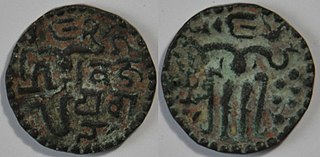Related Research Articles
Alagakkonara, also known as Alakeshwara, were a prominent feudal family that provided powerful ministers and military rulers during the medieval period in Sri Lanka. Some historians claim that the family was of Tamil origin, possibly from Madurai or Kanchipuram in Tamil Nadu, India. The family arrived in Sri Lanka around the 13th century and naturalized themselves in Sri Lanka.

Gampola is a town located in Kandy District, Central Province, Sri Lanka, governed by an Urban Council. Gampola was made the capital of the island by King Buwanekabahu IV, who ruled for four years in the mid-fourteenth century. The last king of Gampola was King Buwanekabahu V, who ruled the island for 29 years. A separate city was built in Kotte during this time by a noble known as Alagakkonara. The longest sleeping Buddha statue in South Asia is located in the Saliyalapura Temple, Gampola.
Vira Alakesvara, also known as Vijayabahu VI, was the last King of Gampola who ruled from 1397 to 1411. He was the last prominent member of the Alagakkonara family.

The current capital of Sri Lanka, since 1982, is Sri Jayawardenepura Kotte. Over the course of the island's history, the national capital has been in several locations other than Sri Jayawardenepura Kotte, the following is a list of cities which have historically served as the capital city of Sri Lanka and its predecessor states.

The Kingdom of Dambadeniya was a medieval kingdom in what is present-day Sri Lanka. The kingdom's rulers reigned from 1220–1345.

Gampola is a town and once an ancient polity located near Kandy in the Central Province of Sri Lanka. It was made the capital city of the island by King Buwanekabahu IV, who ruled for four years in the mid-fourteenth century. King Buwanekabahu IV ascended the throne after his father and shifted the capital from Kurunegala to Gampola, with the support of General Senalankadhikara.
Vira Bahu II was King of Gampola who ruled from 1391/2 to 1397. He succeeded Bhuvanaikabahu V and was succeeded by Vira Alakesvara. He may have been succeeded two of his sons in the year 1397.
Parakrama Bahu Epa was King of Gampola who ruled from 1409 to 1412. He succeeded Vira Alakesvara as king and was the last to reign in Gampola.
Parakramabahu V was King of Gampola who ruled from 1344 or 1345 to 1359. He was the Second King of Gampola co-ruling with his brother Bhuvanaikabahu IV, and was succeeded by his nephew Vikramabahu III.
Vikramabahu III was King of Gampola who ruled from 1357 to 1374. He succeeded his Uncle Parakramabahu V as King of Gampola and was succeeded by his nephew Bhuvanaikabahu V.
Bhuvanaikabahu V was King of Gampola who ruled from 1372/3 to 1391/2. He succeeded his uncle Vikramabahu III as King of Gampola and was succeeded by Vira Bahu II.

Parakramabahu II, also known as Panditha Parakramabāhu, was the King of Dambadeniya in 13th century, whose reign lasted from 1234 to 1269. As a pioneer in literature, he was bestowed with the honorary title "Kalikala Sahitya Sarvagna Pandita". Parakramabahu's reign is notable for the creation of numerous Sinhalese literal works such as, Kausilumina, Pūjāvaliya, Pāli Vishuddḥi Mārgaya, Thūpavaṃsa and Sidhath Sangarāva. He launched a campaign against the Eastern Ganga invader Kalinga Magha, and successfully expelled him in 1255, unifying Sri Lanka under one rule. He succeeded his father Vijayabahu III as King of Dambadeniya, and was succeeded by his elder son, Vijayabahu IV, after his death.

Vijayabahu IV was King of Dambadeniya in the 13th century, who ruled from 1267/8 to 1270. He succeeded his father Parakkamabahu II as King of Dambadeniya and was succeeded by his brother Bhuvanaikabahu I after being murdered consequent to a conspiracy.
Bhuvanaikabahu II was King of Dambadeniya in the 14th century, who ruled 1310 from to 1325/6. He succeeded his cousin Parakkamabahu III as King of Dambadeniya and was succeeded by his son Parakkamabahu IV.
Vijayabahu V was the last King of Dambadeniya in the 14th century, who reigned from 1325/26 to 1344/45. He succeeded Bhuvanaikabahu III as King of Dambadeniya and was succeeded by Bhuvanaikabahu IV, King of Gampola.
Kassapa IV was King of Anuradhapura in the 10th century, whose reign lasted from 912 to 929. He succeeded his uncle Udaya I as King of Anuradhapura and was succeeded by his son Kassapa V.
Kassapa V was King of Anuradhapura in the 10th century, whose reign lasted from 929 to 939. He was also knowned as "Debisechcha Abasalamewan Kasup". And also he knew "Abhidharma" well. "Dampiya Atuwa Gatapadaya" and "dhamma sangani" were written by him. He succeeded his father Kassapa IV as King of Anuradhapura and was succeeded by his son Dappula IV.
Sena IV was King of Anuradhapura in the 10th century, whose reign lasted from 972 to 975. He succeeded Udaya III as King of Anuradhapura and was succeeded by his brother Mahinda IV.
Mahinda IV was King of Anuradhapura in the 10th century, whose reign lasted from 975 to 991. He succeeded his brother Sena IV as King of Anuradhapura and was succeeded by his son Sena V.

The Transitional period of Sri Lanka spans from the end of the Kingdom of Polonnaruwa, in 1232, to the start of the Kandyan period in 1597. The period is characterised by the succession of capitals that followed the fall of the Polonnaruwa Kingdom and the creation of the Jaffna kingdom and Crisis of the Sixteenth Century.
References
- ↑ Paranavitana, S. (1934–1941). Epigraphia Zeylanica Vol. IV. Oxford university press.
{{cite book}}: CS1 maint: date format (link) p. 100-110 - ↑ Goonewardane, Jennifer Paldano (31 January 2018). "Crystal Glasses that Kings Once Wore". Explore Sri Lanka - Once discovered, you must explore...... Retrieved 5 March 2022.
